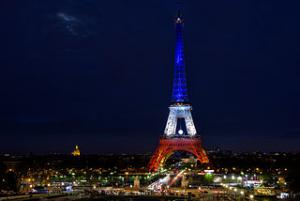European securityParis attacks expose weaknesses in Europe’s security structure
The 13 November attacks in Paris offered a painful demonstration of Europe’s security loopholes which the terrorists exploited to their advantage. The attacks should serve as a wake-up call to Europeans that the continental security structure, built in another era, is no longer sufficient and needs to be adapted to new circumstances. Whether or not such adaptations can be made, and made in time before the terrorists decide to launch another attack, is an open question.

Eiffel tower lit in the colors of the French flag // Source: commons.wikimedia.org
The 13 November attacks in Paris offered a painful demonstration of Europe’s security loopholes which the terrorists exploited to their advantage.
In the wake of the Paris attacks European security experts say the flaws in the continent’s defenses are conspicuous, with no clear plan for fixing them. “We lack the most obvious tools to deal with this threat,” Jean-Charles Brisard, chairman of the Paris-based Center for the Analysis of Terrorism, told the Washington Post. “We’re blind.”
Maintaining tight security in Europe is not easy on a continent whose post-Second World War institutions and laws were designed to facilitate freedom of religious practices and the free movement of citizen. This freedom has allowed thousands of Europeans to be exposed to fiery radical preaching at home before traveling to Syria and Iraq, then return home after receiving training by terrorist organizations and fighting in their ranks.
Security experts say that another large-scale attack in Europe is almost inevitable. European counterterrorism agencies, working hard to prevent such attacks, appear resigned to the fact that such attacks will happen.
“We have to figure out what went wrong and fix it as soon as possible. Because one thing is for sure: Islamic State will try to hit Europe again,” said a senior European intelligence official who spoke on the condition of anonymity.
In the wake of the Paris attacks, President Francoise Hollande announced a state of emergency – initially for three months, but likely to be extended. France, as a member of the EU, cannot isolate itself from other EU countries and their security practices. Belgium internal security, for example, is dysfunctional because of the historical tensions between the French-speaking Walloons and the Flemish segment of the population, and Islamist radicals and terrorists have exploited this situation to their advantage. . Even when domestic security agencies function better than they do in Belgium, coordination among European intelligence services is poor, with no comprehensive, shared list of suspected extremists or an EU-wide biometric database. The Post notes that the Paris terrorist attacks offered a cruel demonstration of Europe’s weak and incoherent security. The crossed unguarded EU borders freely and frequently, with at least five of them also traveling to Syria and back. Most of the nine attackers had already been flagged as potential security threats — but then, so had tens of thousands of others, including 20,000 in France alone. The Paris terrorists were careful not to stand out or give law enforcement a reason to arrest them.
“The systems of European security that at one time were useful and effective are no longer adapted for this threat,” Bernard Squarcini, a former head of France’s domestic intelligence service who now leads the Paris office of the global intelligence firm Arcanum, told the Post. “We are dealing with people who are cunning and determined. They’ve been in combat.”
The 13 November attacks should serve as a wake-up call to Europeans that the continentlla security structure, built in another era, is no longer sufficient and needs to be adapted to new circumstances. Whether or not such adaptations can be made, and made in time before the terrorists decide to launch another attack, is an open question.
